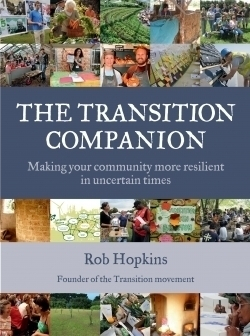The Transition Companion
Making Your Community More Resilient in Uncertain Times
Around us, the world crumbles. Temperatures and ocean levels are rising. Oil supplies are dwindling. Those issues breed more issues, and the growing mound can intimidate us with its size and seriousness. Where on Earth do we begin?
The answer might be found in using the people and resources in our communities. This idea of taking initiative locally defines the Transition Movement, which has blossomed internationally since it was created by college professor Rob Hopkins in the mid-2000s. What’s refreshing about Hopkins compared to many so-called environmental-awareness pundits is that he doesn’t just blather on about good deeds.
His follow-up to the best-selling The Transition Handbook, The Transition Companion provides a practical blueprint for making a difference. “Everything you will read in this book is the result of real work in the real world, with community engagement at its heart,” Hopkins writes. The book’s effectiveness lies in that it doesn’t provide answers, just empowerment. While there is no guarantee for success, there are also no excuses to stand on the sidelines.
Hopkins doesn’t immediately get to these steps. He spends the first quarter of the book outlining pressing environmental crises and detailing how a local way of living—the need for increased community ownership, that is relying on surrounding communities for goods and services—can lead to a more adaptive, productive populace.
To do that takes organization, and Hopkins does a fine job tackling the little details from the beginning (agree on the group’s aim or mission) to more advanced stages (identifying business opportunities for a more localized economy). What gives the book a heartbeat is that Hopkins elicits the help of other like-minded individuals to share advice and experiences, and he’s a remarkably personable. At eighteen, he and his friends were unprepared for the independence brought about by this uncertainty: “If we were all to be washed up on a desert island together,” he writes, “I doubt that any of use would even have had the wherewithal to eat each another.”
We have the ability to change, and Hopkins’ most useful guide is the proof. The Transition Companion can help readers gain footing in uncertain times. Thankfully, the book does not answer every problem. That’s up to readers, who will look at themselves as agents for improvement and not wait for others to provide a brighter future.
Reviewed by
Peter Croatto
Disclosure: This article is not an endorsement, but a review. The publisher of this book provided free copies of the book and paid a small fee to have their book reviewed by a professional reviewer. Foreword Reviews and Clarion Reviews make no guarantee that the publisher will receive a positive review. Foreword Magazine, Inc. is disclosing this in accordance with the Federal Trade Commission’s 16 CFR, Part 255.

